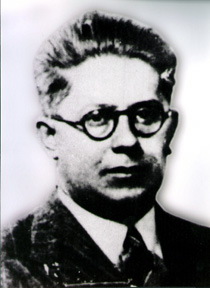Gorsky, Anatoly Veniaminovich (1907-1980)
-

Anatoly Gorsky
Code name “VADIM.” A Soviet intelligence operative in Great Britain and the United States in the 1930s and 1940s.
According to the available information, Anatoly Gorsky was born in 1907 in Eastern Siberia – in the village of Menshikovo in the Kansky district of the Eniseiskaya gubernia of the Russian Empire. According to his official biography, he received only a secondary school education (he studied at the city of Kansk). In 1928, Gorsky began his career at the OGPU, initially working at its Special department and later shifting to its Economic office. In 1936, he was shifted to the OGPU foreign intelligence department – the INO – and in the same year posted to London as an assistant to the then INO London station chief (resident) and simultaneously as a cipher clerk.
In London, Gorsky served under two successive residents, the first of whom was recalled to Moscow in a few months to face execution on false charges of participating in a Trotskyite conspiracy. His successor, Gregory Grafpen, was recalled in November 1938, arrested, tried and sentenced to five years in a prison labor camp for “association with Trotskyites.” Gorsky found himself as a sole INO operative in London – in charge of a large agent network, including the famous “Cambridge Five.” In the wake of the mass purges which decimated foreign intelligence, the London station was closed and Gorsky was recalled to Moscow in early 1940. At that time, he had been running 18 agents, including the “Cambridge Five.” Despite important information received from its members on the eve of the outbreak of WWII, in February 1940, the London station was closed – allegedly on an instruction of Lavrenty Beria as not worthy of political trust.
After he returned to Moscow in March 1940, Gorsky was assigned to the British section of the intelligence Headquarters. However, in August of the same year the intelligence leadership decided to send him back to London to resume contact with the British sources.
In November 1940, Gorsky returned to London, this time as its station chief (resident), working under the cover of attaché and then Second Secretary of the Soviet Embassy. Initially a three-man operation, by the end of the same year, the London station was reinforced by four more operatives and by early 1944 numbered 12 operatives. Besides the “Cambridge Five” and other sources of political information, the station was running sources who provided the Soviets with an early warning on the British atomic bomb project. Among the most important information provided by Gorsky’s London sources was an advance warning concerning the Nazi plans for the summer assault in the direction of the city of Kursk, for which Gorsky was later awarded with the Badge of Hornor order. In later part of 1943, Gorsky left London for Moscow, succeeded by a new resident, Constantine Kukin.
In Moscow Gorsky soon began preparation for a new important assignment. In September 1944, he arrived in Washington D.C. as NKGB resident, operating under diplomatic cover with the rank of First Secretary of the Soviet Embassy and using the alias of Anatoly Borisovich Gromov. In his diplomatic role, Gorsky worked as the Embassy’s press officer, monitoring American press and radio broadcasts and sending detailed monthly reports to the Soviet Foreign Office (NKID). His second cover was that of an authorized representative of VOKS – a society for promoting contacts in the cultural sphere. On the VOKS front, “Gromov” served as a sort of liaison between the Soviets and a wide range of American “contacts.” From the VOKS files we can see that “Gromov” corresponded, met and talked with famous writers, artists and musicians, discussed postwar plans for exchanging concert artists and other attractions, and took part in various public and cultural events. His contact list included American government agencies and institutions such as the U.S. Armed Forces Institute and the U.S. War Department, the U.S. Office of War Information, the U.S. Department of Agriculture, the Federal Security Agency, the National Research Council and the United Nations Information Office, to name a few.
At the same time, Gorsky was running a huge network of agents, sources and contacts, which provided political, military and scientific/technical information, including information on the production of the atomic bomb.
Gorsky left the United States hastily on December 7, 1945, after the NKGB learned about the defection of their long-time agent, Elizabeth Bentley. For his work in the United States, Gorsky was promoted to the rank of Colonel and awarded many high government orders and medals. he continued his foreign intelligence career in Moscow: from 1946 to 1950, he was head of the First Department of the MGB Foreign Intelligence Directorate and as well travelled to other countries on short-term missions.
There is no reliable information regarding Gorsky’s subsequent career – as well as the reasons for a sudden end of his intelligence service. In mid-1950s, together with another legendary spymaster from the 1940s, Lev Vasilevsky, Gorsky translated into Russian a popular adventure novel, Captain Blood: His Odyssey by Rafael Sabatini, which is still a popular reading in Russia. Gorsky died in 1980. 1
- Gorsky, Anatoly Veniaminovich at the official site of the SVR http://svr.gov.ru/history/gors.htm; V.S. Antonov, Anatolii Gorskii na peredovoi vneshnei razvedki. – Nezavisimoe Voennoe Obozrenie (NVO), 16.12.2011 (V.S. Antonov, Anatoly Gorsky at the Frontlines of the Foreign Intelligence, The Independent Military Review (NVO), December 16, 2011.) Antonov’s article is limited to Gorsky’s London period of work. ↩

